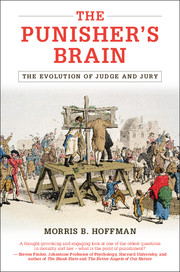Book contents
- Frontmatter
- Contents
- Acknowledgments
- Introduction
- 1 The Most Original of Original Sins
- 2 Detecting and Blaming
- 3 First-Party Punishment: Conscience and Guilt
- 4 Second-Party Punishment: Retaliation and Revenge
- 5 Third-Party Punishment: Retribution
- 6 Forgiveness and Its Signals
- 7 Delegating Punishment
- 8 Legal Dissonances
- 9 Evaluating Some Process Dissonances
- 10 Into the Gap: Evaluating Some Substantive Dissonances
- 11 Brains Punishing Brains
- Index
- References
4 - Second-Party Punishment: Retaliation and Revenge
Published online by Cambridge University Press: 05 May 2014
- Frontmatter
- Contents
- Acknowledgments
- Introduction
- 1 The Most Original of Original Sins
- 2 Detecting and Blaming
- 3 First-Party Punishment: Conscience and Guilt
- 4 Second-Party Punishment: Retaliation and Revenge
- 5 Third-Party Punishment: Retribution
- 6 Forgiveness and Its Signals
- 7 Delegating Punishment
- 8 Legal Dissonances
- 9 Evaluating Some Process Dissonances
- 10 Into the Gap: Evaluating Some Substantive Dissonances
- 11 Brains Punishing Brains
- Index
- References
Summary
From panic, pride and terror, revenge that knows no rein.
Rudyard KiplingThe Avenging Animal
History is full of retaliation and revenge because people are full of retaliation and revenge. When the invading Romans made the mistake of flogging the Celts’ king's widow, Boudicca, and raping her daughters, she raised an army that wreaked havoc from one end of Britain to the other. It took three legions to restore order, and by that time Boudicca had burned three Roman settlements, including London. Her army was finally defeated in the West Midlands. As she and her daughters rode around on her chariot to rally her doomed troops for the final lost battle, Tacitus reports that she told them:
I am not fighting for my kingdom and wealth. I am fighting as an ordinary person for my lost freedom, my bruised body and my outraged daughters.…The gods will grant us the vengeance we deserve.
God's vengeance is retaliatory precisely because when we sin we sin against God's direct commands. Punishments by deities are not restrained third-party punishments meted out against remote wrongdoers. They are in divine and terrifyingly unrestrained retaliation for cheating the gods directly. Adam and Eve were banished from Eden because God was retaliating against them for breaking his rules. Constructs of Hell are likewise a type of heavenly revenge. The fear of heavenly revenge is meant to deter us from earthly wrongs. One of the profoundly civilizing effects of all religions is to turn social codes – which inherently may have insufficient bite – into divine commands with infinite bite.
- Type
- Chapter
- Information
- The Punisher's BrainThe Evolution of Judge and Jury, pp. 121 - 149Publisher: Cambridge University PressPrint publication year: 2014



